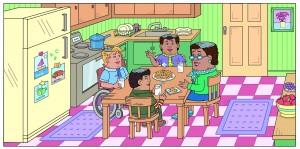Storytelling is a key building block when trying to develop writing skills in young children. WHY? Because writing is storytelling on a page.
The cry a parent often hears about writing is something like, “I hate writing! I can’t write.”! Translation-I am not comfortable writing. If your child can tell a story, he or she can write a story. Writing is storytelling on a page!
Unfortunately, most of us don’t prepare our children to write the way we prepare them to know the alphabet. We focus on the alphabet counting, and other learning skills during their preschool and kindergarten years. Yet, writing is a skill that most of us will need and use for the rest of our lives. Being comfortable writing and writing well is critical to our academic and employment success.
I am not talking about grammar, punctuation or understanding sentence structure. These skills will be taught in school. I refer to the ability to describe something on paper that was seen, heard, read or told about.
It’s all about storytelling. It is more than the stories you read to your child from a book. It is the storytelling that comes from sharing family history or events. It can be making up stories about everyday activities as you spend time with your child. Being read to captures a child’s interest, expands his/her knowledge and fosters creative thinking. However, the ability to tell a story is a key building block of writing a story. The ability to tell and write a story must be practiced like any other skill.
Most of my life I’ve earned an income from writing. I’ve authored a biography and a children’s book. My digital media work includes articles, technical writing, reports, recipes, programs, children’s stories, web content and blogging. I owe my comfort and enjoyment of writing to my extended family. By the time I was two years old, my godmother and grandparents were telling me stories and helping me to tell stories about the things I saw when out walking or visiting with them. Even before I could write, they encouraged me to tell them stories and they wrote them down for me. Then the stories were taped to their refrigerator for all to read. I couldn’t wait until I had the skills to write my own stories. It was all the motivation I needed to learn the alphabet and begin writing.
There is no more undivided attention a child can get than time spent with an adult or older sibling exploring something new. He or she can then tell a story about that experience. It can be as simple as a trip to the supermarket, a walk in the park, or helping to wash the car.
Initially, your child needs you to guide him or her through the process of making up a story. At first, you will need to ask your child questions to trigger storytelling. After awhile that won’t be necessary.
Storytelling is a family affair and one that offers a role for grandparents and other relatives. Photo albums, attics full of stuff, and scrapbooks are just some of the things that can spark stories. Recording the story is a critical part of the process. Being able to look at and refer to his or her story, in writing, establishes a comfort level about writing.


